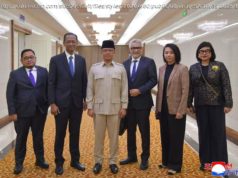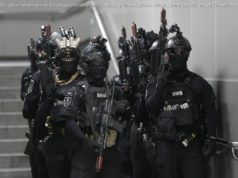This week the new South Korean President Moon Jae-In will visit the United States and have his first meeting with U. S. President Donald Trump. Moon’s policies towards North Korea are less aggressive than those of the U. S.
This week the new South Korean President Moon Jae-In will visit the United States and have his first meeting with U. S. President Donald Trump. Moon’s policies towards North Korea are less aggressive than those of the U. S. From threatening military strikes on the North while all but inviting Kim Jong Un to a Mar-a-Lago tete-a-tete, to threatening to tear up trade and defense pacts with South Korea, Trump has thoroughly confused America’s Asian allies. The effects of his contradictory statements will come home to roost this week, when South Korean President Moon Jae-in visits Washington. Moon is crafting his own approach to dealing with Kim, while Trump’s behavior could hardly be undermining U. S. influence more. While Moon may try to show some unity with the U. S. he will no doubt insist on his own agenda of trying to engage North Korea diplomatically. There is considerable opposition to the U. S. deployments of the Terminal High Altitude Are Defense (THAAD) anti-missile system in South Korea. The system was rapidly deployed so as to be in place before Moon became president. However, there is to be deployment of four additional missile launchers and Moon has suspended their deployment until the results of a probe are in. However, two launchers are already active and operational. According to some reports, Trump is furious over Moon’s decision. Both Russia and China have objected to the system on the grounds that it could very easily be used against them. Moon has adopted a distinct change in tone with China over the THAAD issue, indicating he wanted to negotiate on the issue together with the U. S. This is in contrast to former president Park-Geun-hye who scolded Beijing for insisting that the system not be deployed. Some in China are hoping that South Korea can be wooed away from its dependence on the U. S., but more likely Moon will attempt some compromise that will retain ties with the U. S. Moon appears to be disenchanted with the deterrence plus approach of the U. S. which has not changed the behavior of the North except to convince it that it must forge ahead with its missile programs more quickly. While Moon agrees with the sanctions approach, he also wants to pursue a diplomatic dialogue approach at the same time. The two countries are still technically at war as the 1950-53 conflict ended with a truce not a peace treaty. A spokesperson for the Unification Ministry of South Korea, Nikki Haley said that the U. S. would talk to North Korea only once it halted its nuclear program. North Korea no doubt wants to use the nuclear program as leverage in talks. The U. S. has completely unrealistic expectations as to the effects of pressure on North Korea. Such demands simply show to the North it is justified in moving more quickly to ensure it can defend itself against the U. S. The U. S. has further exacerbated relations with South Korea by suggesting THAAD should be paid for by the South. The two leaders differ not just in their approach to North Korea but there are concerns in South Korea about Trump’s protectionist sentiments and his threat to amend or even withdraw from the US-Korea Free Trade Agreement. South Koreans and others may find it difficult to fathom exactly what Trump’ policy is as a recent article notes: While Moon may try to show some unity with the U. S. he will no doubt insist on his own agenda of trying to engage North Korea diplomatically. There is considerable opposition to the U. S. deployments of the Terminal High Altitude Are Defense (THAAD) anti-missile system in South Korea. The system was rapidly deployed so as to be in place before Moon became president. However, there is to be deployment of four additional missile launchers and Moon has suspended their deployment until the results of a probe are in. However, two launchers are already active and operational. According to some reports, Trump is furious over Moon’s decision. Both Russia and China have objected to the system on the grounds that it could very easily be used against them. Moon has adopted a distinct change in tone with China over the THAAD issue, indicating he wanted to negotiate on the issue together with the U. S. This is in contrast to former president Park-Geun-hye who scolded Beijing for insisting that the system not be deployed. Some in China are hoping that South Korea can be wooed away from its dependence on the U. S., but more likely Moon will attempt some compromise that will retain ties with the U. S. Moon appears to be disenchanted with the deterrence plus approach of the U. S. which has not changed the behavior of the North except to convince it that it must forge ahead with its missile programs more quickly. While Moon agrees with the sanctions approach, he also wants to pursue a diplomatic dialogue approach at the same time. The two countries are still technically at war as the 1950-53 conflict ended with a truce not a peace treaty. A spokesperson for the Unification Ministry of South Korea, Lee Duk-haeng, said: «Our most basic stance is that communication lines between South and North Korea should open. The unification ministry has considered options on this internally but nothing has been decided yet.» There has been no immediate response from the North. There has been a hotline between the North and South since the 1970’s according to Al Jazeera reporter Andrew Thomas in Seoul the capital of the South. The line is used to relay messages in emergencies but since February of last year the North has not answered the phone. Nikki Haley said that the U. S. would talk to North Korea only once it halted its nuclear program. North Korea no doubt wants to use the nuclear program as leverage in talks. The U. S. has completely unrealistic expectations as to the effects of pressure on North Korea. Such demands simply show to the North it is justified in moving more quickly to ensure it can defend itself against the U.






